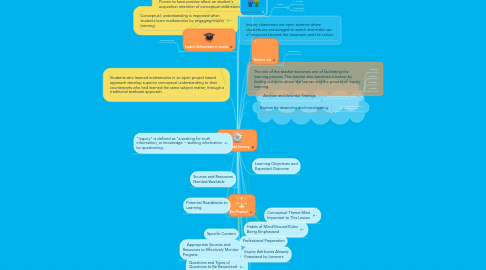Inquiry Based Learning
por Arla Shelton


1. Conceptual; understanding is improved when students learn mathematics by engaging inquiry learning
2. Students who learned mathematics in an open project based approach develop superior conceptual understanding to their counterparts who had learned the same subject matter, through a traditional textbook approach.
3. Proven to have positive effect on student's acquisition retention of conceptual understanding
4. Student Achievement or success
4.1. Supporting Staff
5. "Inquiry" is defined as "a seeking for truth, information, or knowledge -- seeking information by questioning.
6. Best Practice!
7. Specific Content
7.1. Schedule
7.2. Budget
7.3. Resources
7.4. Delays
8. Sources and Resources Needed/Available
9. Potential Roadblocks to Learning
10. Questions and Types of Questions to Be Raised and Explored
11. . Appropriate Sources and Resources to Effectively Monitor Progress
12. Conceptual Theme Most Important to This Lesson
13. Habits of Mind/Ground Rules Being Emphasized
14. Learning Objectives and Expected Outcome
15. Explore by observing and investigating.
15.1. Communicate and share by writing and discussing.
16. Analyze and describe findings.
16.1. Reflect on what has been learned.
17. Inquiry classrooms are open systems where students are encouraged to search and make use of resources beyond the classroom and the school.
18. The role of the teacher becomes one of facilitating the learning process. The teacher also becomes a learner by finding out more about the learner and the process of inquiry learning.
18.1. Materials
18.2. Personel
18.3. Services
18.4. Duration
19. Students' role
19.1. 2. Extent
19.1.1. 1. Included
19.1.2. 2. Excluded
